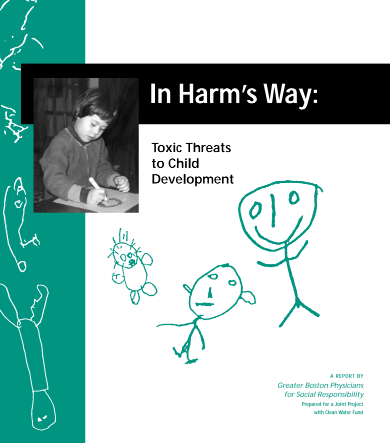On This Page:
Why it matters
Those of us working to be Ready for 100 in Chester County are led by a deep concern for the future and we know know we need to act quickly because there is so much at stake if we get started in this decade. Below you will see some of the reasons our volunteers get involved and stay involved. Why does this matter to you?
It matters because we care about WHAT’S AT STAKE IN PENNSYLVANIA and BEYOND
Climate change creates new risks and exacerbates existing vulnerabilities, with growing challenges to human health and safety, quality of life, and the rate of economic growth.
Big Picture
Our State
It matters because we care about DOING OUR FAIR SHARE
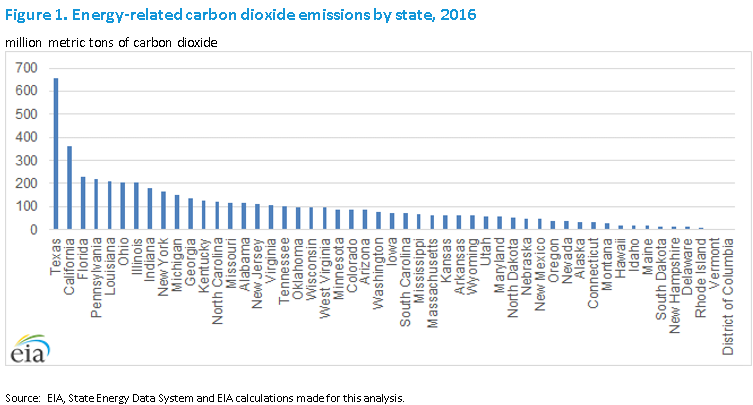 As a state that has produced significant emissions through coal, oil and gas, it is not surprising that PA ranks as 3rd worst in the country for CO2 Emissions. Even though we represent .2 percent of the world population, we generate 1 percent of the world’s heat-trapping emissions, a much higher rate of per capita emissions compared to the rest of the world. In the United States, Pennsylvania accounts for 4.3% of U.S. emissions! To do our fair share to reduce the global emissions, we need to take our work seriously.
As a state that has produced significant emissions through coal, oil and gas, it is not surprising that PA ranks as 3rd worst in the country for CO2 Emissions. Even though we represent .2 percent of the world population, we generate 1 percent of the world’s heat-trapping emissions, a much higher rate of per capita emissions compared to the rest of the world. In the United States, Pennsylvania accounts for 4.3% of U.S. emissions! To do our fair share to reduce the global emissions, we need to take our work seriously.
In addition, we know that the health and community impacts of fossil fuel use does not effect everyone equally. We are also committed to environmental justice for workers and communities where pollution, spills and working conditions put them ate greater risk.
Seventh Generation and Ready for 100 Environmental Justice series
- Ep 1 St Louis Missouri – focus on health
- Ep 2 Climate Justice Youth activist
- Ep 3 Youth Activist speaks
- Ep 4 iMatter – Youth
- Ep 5 Climate Parents
Greta Thunberg on the ethics of climate policy
The Ethical Dimensions of Climate Change
It matters because we care about our PROTECTING OUR HEALTH
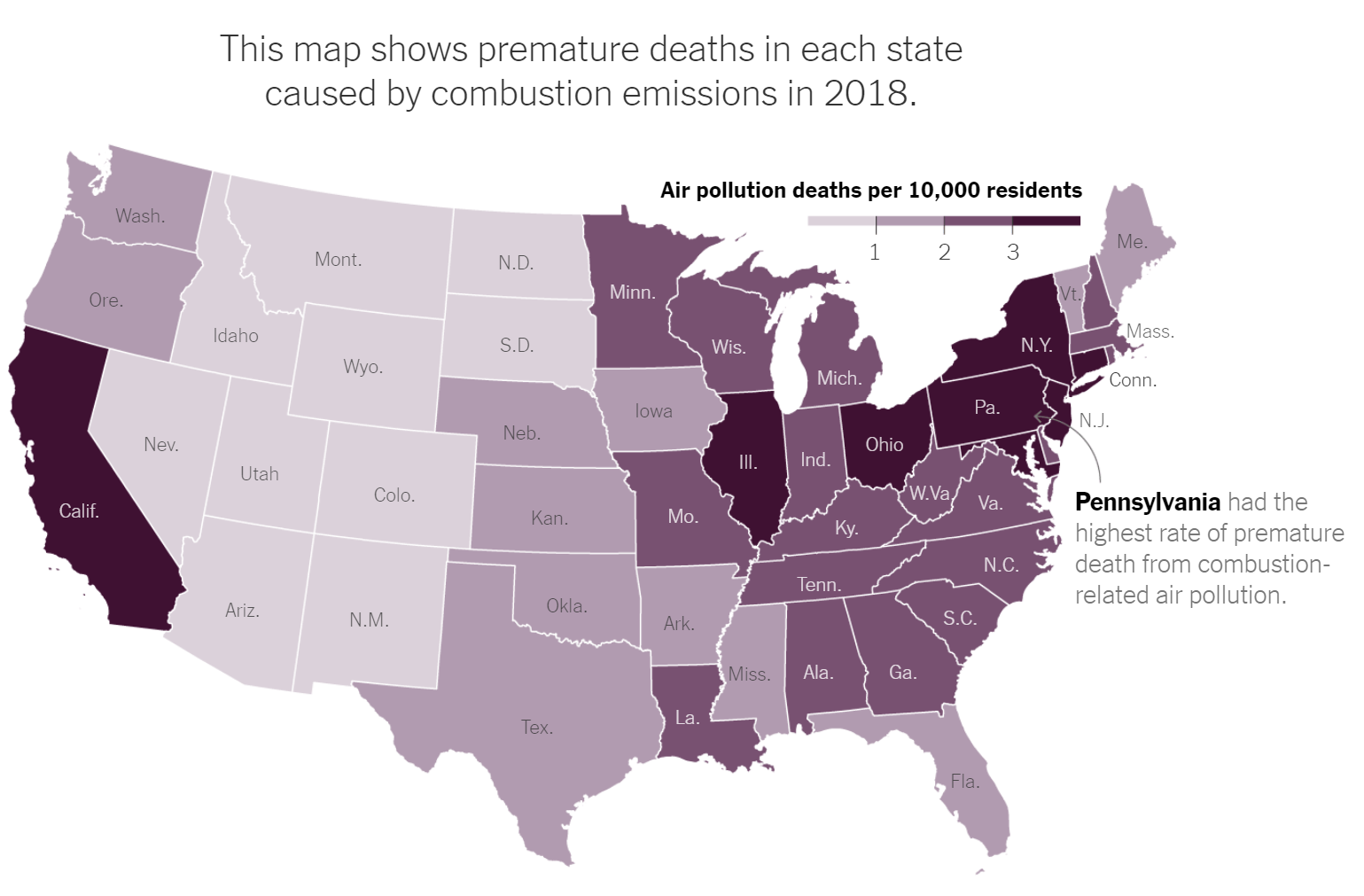 Burning fossil fuels has the unintended consequence of harming human health - from early death from heart disease to asthma to the spread of infectious diseases. Fossil fuel production and climate change impacts put us all at risk. Temperatures exceeding 90°F are projected to become common by mid-century, increasing human health risks such as heat stress, heat exhaustion, and life-threatening heatstroke. Such risks disproportionately affect those who are poor, elderly, very young, suffering from chronic diseases, or otherwise unable to escape the heat. Global warming could increase the levels of airborne pollen and lung-damaging air pollution. Poor air quality increases the risk of respiratory illnesses such as asthma, chronic bronchitis, and emphysema. Higher temperatures can prolong the pollen-allergy season while elevated CO2 levels accelerate the productivity of key pollen-allergen sources. (UCS*) Learn more:
Burning fossil fuels has the unintended consequence of harming human health - from early death from heart disease to asthma to the spread of infectious diseases. Fossil fuel production and climate change impacts put us all at risk. Temperatures exceeding 90°F are projected to become common by mid-century, increasing human health risks such as heat stress, heat exhaustion, and life-threatening heatstroke. Such risks disproportionately affect those who are poor, elderly, very young, suffering from chronic diseases, or otherwise unable to escape the heat. Global warming could increase the levels of airborne pollen and lung-damaging air pollution. Poor air quality increases the risk of respiratory illnesses such as asthma, chronic bronchitis, and emphysema. Higher temperatures can prolong the pollen-allergy season while elevated CO2 levels accelerate the productivity of key pollen-allergen sources. (UCS*) Learn more:
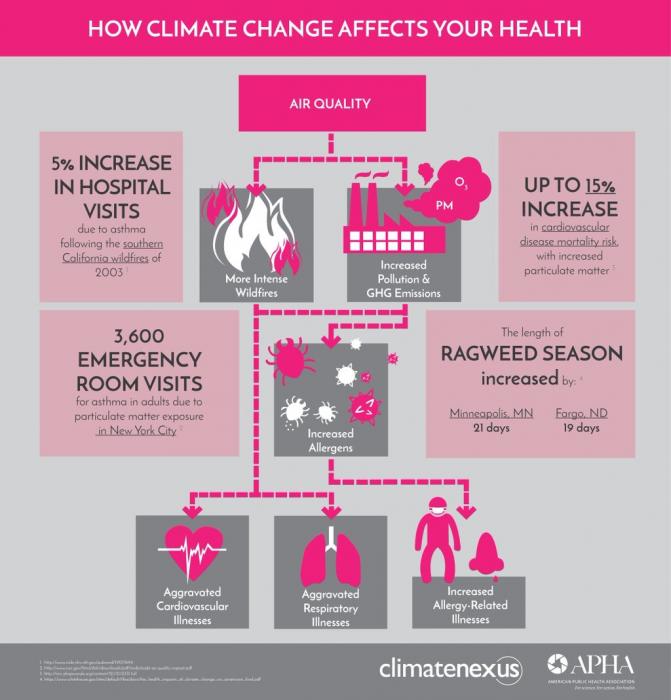
- The Health impacts of Climate Change
- Unequal vulnerability to a heat wave
- Lancet Countdown Report on Health Impacts on Children
- Climate Impacts on Human Health (EPA)
- How Climate Change Threatens Public Health
- Premature mortality related to United States cross-state air pollution
- How Climate Change Affects Children’s Health (audio)
- Climate Change Is Having Widespread Health Impacts
Premature Deaths map from: https://www.nytimes.com/2020/02/12/climate/air-pollution-health.html
It matters because we care about HEALTHY FOOD PRODUCTION
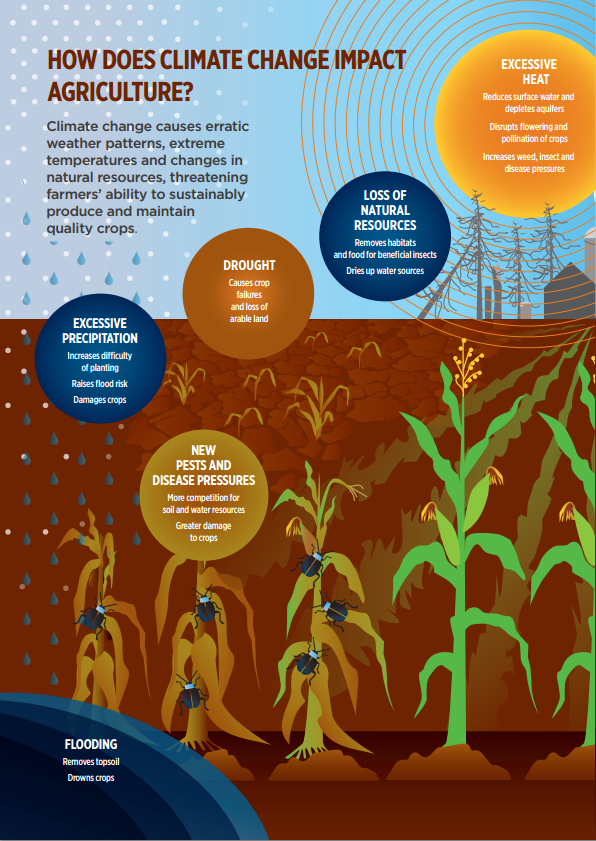 Farmers are already experiencing the consequences of climate change such as direct crop damage from increasingly intense precipitation events. Currently, summers in Pennsylvania are ideal for growing sweet corn. Many July and August days are projected to be substantially hotter by mid-century, thereby reducing the crop’s yield and quality. (EPA, 2017) Yields of native Concord grapes, sweet corn, and favorite apple varieties may decrease considerably as temperatures rise and pest pressures grow more severe. Pennsylvania is the country’s fourth-largest producer of apples, grown mostly in the southeastern part of the state. By mid-century under the higher-emissions scenario, only half the winters in the southern part of the state would meet the cold-temperature requirements of popular varieties of apples, including McIntosh and Granny Smith. Dairy farmers face substantial challenges as hot temperatures and heat stress depress milk production. (UCS*) Learn more:
Farmers are already experiencing the consequences of climate change such as direct crop damage from increasingly intense precipitation events. Currently, summers in Pennsylvania are ideal for growing sweet corn. Many July and August days are projected to be substantially hotter by mid-century, thereby reducing the crop’s yield and quality. (EPA, 2017) Yields of native Concord grapes, sweet corn, and favorite apple varieties may decrease considerably as temperatures rise and pest pressures grow more severe. Pennsylvania is the country’s fourth-largest producer of apples, grown mostly in the southeastern part of the state. By mid-century under the higher-emissions scenario, only half the winters in the southern part of the state would meet the cold-temperature requirements of popular varieties of apples, including McIntosh and Granny Smith. Dairy farmers face substantial challenges as hot temperatures and heat stress depress milk production. (UCS*) Learn more:
A Brief report on the Impacts of climate change on food production
How Climate Change Will Alter Our Food, Columbia University
It matters because we care about OUR LOCAL ECOSYSTEMS
Climate change is ushering in broad-scale habitat changes that will affect Pennsylvania's ecosystems and the species that call Pennsylvania home. As many as half of the 120 bird species modeled in Pennsylvania could see at least 25-percent reductions in their suitable habitat because of changes in climate and vegetation this century, with the greatest potential losses occurring in habitat for migratory birds. Species at the greatest risk from changing climate and loss of their preferred habitat in Pennsylvania include the ruffed grouse, white-throated sparrow, magnolia warbler, and yellow-rumped warbler.The forested northern portion of Pennsylvania could experience some of the greatest losses in suitable bird habitat across the northeastern United States.
Pennsylvania’s forests are at risk. Suitable forest habitat for maple, black cherry, hemlock, and others is expected to shift northward by as much as 500 miles by late century under the higher-emissions scenario. This will threaten tourism as well as lucrative timber such as world-renowned black cherry. Warming climate and shifting distributions and quality of forest habitat is expected to cause substantial changes in bird life. As global warming drives up air temperatures and changes precipitation patterns, altered seasonal stream flows, higher water temperatures, and diminished shade along stream banks may follow. The native brook trout and smallmouth bass are particularly sensitve to such changes. (UCS*)
- How Climate Change will affect Pennsylvania’s birds
- Protecting Pennsylvania’s Plants and Animals
- Climate Impact on Ecosystems
It matters because we care about LIVELIHOODS AND LOCAL ECONOMIES
Rising temperatures and expected increase in precipitation levels along with the resulting impacts, will inflict economic costs on important sectors of Pennsylvania’s economy. Increasingly hot summers are likely to reduce yields of corn, Pennsylvania’s most important crop. The earlier arrival of spring may increase populations of major crop pests, such as the corn earworm and aggressive weeds. Higher temperatures cause cows to eat less and produce less milk, so a warming climate could reduce the output of milk and beef, which together account for more than one-third of the commonwealth’s farm revenues. (Epa 2017) Pennsylvania’s Concord grape industry, located near Lake Erie, is a major source for the nation’s grape juice makers. This native grape requires cold winter temperatures for optimal flowering and fruit production.
Changes in the distribution of forest types are predicted to affect the timber industry, hunting and other recreational industries. The snow season is retreating to the state’s highland regions within just the next few decades. By late century, snow cover could be lost entirely in most years. Both the ski and snowmobile industries would be hard hit—snowmobiling and cross country skiiing will be harder hit at first, because they rely heavily on natural snow to cover the trails. Rising winter temperatures are expected to eventually render snow-making impractical.
Changes in the distribution of forest types are predicted to affect the the timber industry, hunting and other recreational industries. Pennsylvania is already vulnerable to extreme weather events, and its infrastructure, distribution of utility services, such as water and energy, and the shipping industry may be impacted, if greater rates of precipitation and more frequent and intense hurricanes occur as projected in climate change models.
Recovering from disasters 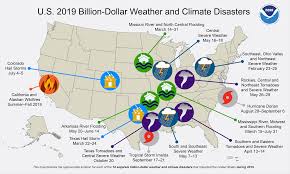 is extremely costly, as is mitigation of public safety risks of things like extreme heat, and the impact that weather has on agriculture. Pennsylvania Auditor General Eugene DePasquale published a report documenting the financial costs in the state brought on by the effects of climate change. The report found that in 2018, Pennsylvania spent $261 million on climate-related costs. Of that amount, $125.7 million was spent on repairing infrastructure damaged by severe weather like floods and landslides.
is extremely costly, as is mitigation of public safety risks of things like extreme heat, and the impact that weather has on agriculture. Pennsylvania Auditor General Eugene DePasquale published a report documenting the financial costs in the state brought on by the effects of climate change. The report found that in 2018, Pennsylvania spent $261 million on climate-related costs. Of that amount, $125.7 million was spent on repairing infrastructure damaged by severe weather like floods and landslides.
On the opportunity side, Pennsylvania is seeing a growth in safer, healthier and well paying jobs in the transition to clean energy. Both energy efficiency and the installation of renewable energy (wind and solar). According to a 2019 report, “Since 2014, Pennsylvania has increased its workforce in clean technologies like renewables, energy efficiency, clean vehicles, storage, and grid modernization by nearly 60 percent – employing now twice as many workers as the state’s entire fossil fuel industry. This recent growth over the past several years has put Pennsylvania within 4,400 jobs of overtaking Virginia as the No. 10 state in the U.S. for clean energy employment.”
- Billion-Dollar Weather and Climate Disasters: Overview
- Clean Jobs Pennsylvania
- International Renewable Energy Agency
It matters because we care about INVESTING WISELY
We are all pouring money into a polluting energy system. The US spends more than $1 trillion on energy every year. Our households and businesses spend 10-50% of income on energy. Government agencies spend more than $10 billion annually on energy to provide public services. When we shift to energy efficiency (with the potential to save at least 23% of energy demand) and transition to renewable energy we see a prowerful return on our investment. We save money, strengthen local businesses, create good paying local jobs, and clean our air and water.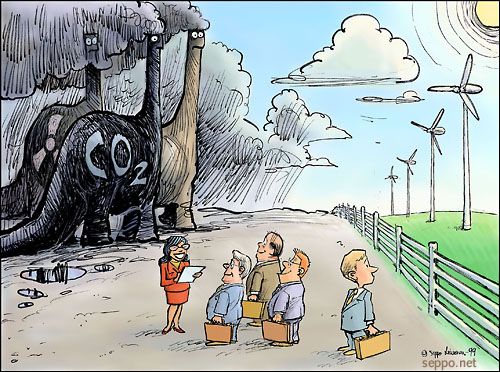
Businesses across the country have begun to understand that investing in clean energy is good for their bottom line as well as good for their workers and communities. The US military is also investing in clean energy. We Mean Business is just one of many corporate initiatves. Their mission is to ensure that the world economy is on track to avoid dangerous climate change by 2020 while delivering sustainable growth and prosperity for all. The Climate Group works with the world's most influential companies committed to 100% renewable power.
By 2030, solar PV will be the cheapest electricity source with its levelized cost at around $0.046/kWh, followed by onshore wind at $0.050/kWh, both will be much lower than coal power at $0.096/kWh, according to Energy Intelligence.
- Power behind the plug video
- Five Years of the We Mean Business Coalition video
- We Mean Business
- The Climate Group
- International Renewable Energy Agency
- US Military Marches Forward on Clean Energy
- The US Military: Winning the renewable war
- It's Time To Power Your Life Differently, OVO Energy (1:00)
- Budweiser, by Anheiser Busch (0:30)
It matters because we care about LEAVING A LEGACY FOR OUR CHILDREN AND GRANDCHILDREN
- You did not act in time – Greta Thunberg in the UK
- Storyteller
- A bedtime story video by Jessica Morseau (1:09
- Global Warming Is An Approaching Train. by Starrdreams (0:26)
- Ontario: Global Warming


Primary source: Union of Concerned Scientists (UCS) Report on PA
